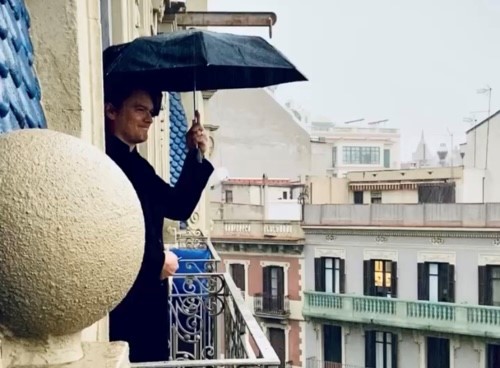Ex-quarterback who went viral as balcony opera singer to perform at ASU

Editor’s note: This story is featured in the 2022 year in review.
Gus Farwell is known as the former quarterback who went viral for singing opera from his seventh-floor balcony in Barcelona, Spain, during the pandemic lockdown in 2020.
Farwell’s life — from high school football player to ASU Sun Devil to the balcony opera guy — is operatic in its highs and lows.
His journey will come full circle when he performs at a free event Nov. 4 called “Gridiron to ASU Gammage” at Arizona State University.
“We’re calling it a concert pep rally,” Farwell said. “It’s going to be very much a love letter to ASU.”
As a teenager in Los Gatos, California, Farwell enjoyed being in musical theater, but he never heard opera. Then one night when he was hanging out at a friend’s house, the CD player skipped to his friend’s parents’ opera CD.
“It was a really visceral moment where the room melted away from me,” he said. “I remember getting lost in the music.”
He asked to borrow the CD, and he still has it. At his 20th high school reunion, his friend told him she had no idea that’s how his love of opera started and that he could keep the CD.
As a first-year student at ASU — which Farwell chose because of its theater program — he was a walk-on on the football team, playing backup behind quarterback Jake Plummer. In his second year, he went to the 1997 Rose Bowl with the team. A few days before the game, the coach told the players that they would be heading to Universal Studios the next day to participate in a talent show.
“I decided the best thing I could do is sing ‘Ridi Pagliaccio’ from ‘Pagliaccia,’ ” he said. “That’s something I should think about singing now, not when you’re 19.”
Gus Farwell performed opera on his balcony in Barcelona for 65 days during the pandemic lockdown of 2020 — in all kinds of weather. Photo courtesy of Gus Farwell
So, in front of the Arizona State and Ohio State football teams and the media cameras, he began singing a cappella.
“Everyone started laughing,” he said. “Then all of a sudden everyone was silent and thought, ‘Oh my, he’s serious.’ ”
After an amazing Rose Bowl experience, despite the dramatic 20–17 loss, Farwell was looking forward to returning to campus in Tempe. Plummer would be finishing school and heading to the NFL, and Farwell would have a shot at the quarterback position.
But it all fell apart a few days later, when he found out that one of his best friends from high school had been killed by a drunk driver. The friend had been enormously supportive during Farwell’s senior year of high school, when his father died of pancreatic cancer.
Reeling from the loss, Farwell left the football team and ASU in the middle of the semester, failing all his classes.
Eventually, he got back on his feet, boosting his grades in community college and graduating from Santa Clara University.
Still interested in opera, he met the woman who became his wife during a trip to Europe, and he sang for her.
“I said, ‘I don’t know what to do with it,’ and she said, ‘You can’t do nothing,’ ” he said.
He moved to Los Angeles and waited tables and tended bar to earn enough money to pay for $300-an-hour voice lessons from an opera singer.
“He gave me the bargain price,” Farwell said. “I would go for half an hour when I could.”
Then things started picking up. He and his wife, a breast-cancer survivor, planned a big charity event, at which he performed his first opera solo. That led to an invitation to perform at the Muhammad Ali Celebrity Fight Night fundraiser in Scottsdale, Arizona, in 2012, where he sang Billy Joel’s “Piano Man.”
“I also sang ‘O Solo Mio,’ and at the end, Tom Hanks got up and grabbed the flowers out of the centerpiece and started throwing tulips onto the stage,” he said.
A few years later, he performed in Los Angeles and met Spanish opera singer Placido Domingo, who he said told him, “You belong in the opera house.”
Farwell and his family moved to Barcelona, where he prepared at the Gran Teatre del Liceu. In 2019, he decided to enter a new opera competition in Florence, Italy.
“One thing I’ve faced in my career is being too old for everything,” he said, noting that many programs and competitions are intended to give young performers a boost. But the Florence competition was open.
“I put so much effort into it,” he said. “I drove my family 14 hours from Barcelona, and I didn’t make it past the first round.
“That was really disheartening. I thought maybe this wouldn’t work out. So I stopped singing. I wasn’t practicing. And I tried to get myself into a place where I was OK with that.”
And then the pandemic hit and Barcelona went into strict lockdown. The newspaper reported that everyone was asked to go out onto their balconies and porches at 8 p.m. to clap for the medical workers.
“Everyone was out clapping, and an ambulance went by and it was really emotional because everyone cheered the ambulance like it was a running back, running down the field,” Farwell said.
“That’s when I got caught up in the moment, and I blurted out the last couple of notes from ‘Nessum Dorma.’ Everyone cheered, and I thought that would be it.”
But the next day his wife suggested he sing an aria. He wasn’t thrilled with the idea, believing that would make the event about him, but his wife said, “They need something.”
So he sang the first verse and chorus of “O Solo Mio” a cappella.
“I thought I would hit the high note at the end and be out of there, but everyone went nuts and started chanting, ‘Otre! Otre!’ (‘Another! Another!’)”
“I started singing anything that popped into my head, although I hadn’t thought about arias in a long time.”
Then he put his sound system speakers on the balcony to add a backing track. His daughter took a video from the apartment’s other balcony, and his wife posted it online and it went viral.
What was supposed to be a lark for 14 days turned into 65 days of balcony opera.
“I still have the pages where we drew up a calendar with what I would sing,” he said. “It was, ‘What’s for dinner, and what is Dad going to sing?’ ”
Besides opera favorites, Farwell also performs pop music, Broadway and American standards. Photo courtesy of Gus Farwell
Finally, the lockdown eased, and on one Friday, he learned that the following Sunday night would be the final balcony applause. He was glad he had some time to prepare.
“There’s a tradition in opera that if you get to a certain level, whenever you walk onstage, no matter what’s going on in the opera, everyone starts to applaud,” he said.
“I walked out on that balcony, and a raucous sound hit me and I immediately started crying. The street was packed, all of the balconies were full and all of the rooftops were full.
“I could barely get through the last song. I can hear it in my voice how emotional I was. It was one of the most special moments of my life.”
The next morning, a recording of his performance was on “Good Morning America.”
“Everyone wanted to know, ‘What’s next?’ ”
As it turns out, not much.
“COVID held on. You couldn’t book anything,” he said.
But during his balcony performances, he had chatted with Colleen Jennings-Roggensack, vice president for cultural affairs at ASU and executive director of ASU Gammage.
“We talked about my time at ASU, and I told her I used to sneak into Gammage from the loading dock when I was a freshman,” he said.
“I would stand on the stage in the dark and look up at the empty chairs and say, ‘One day I’ll perform here.’ “
And that day is Nov. 4, when Farwell will perform in the family-friendly “Gridiron to ASU Gammage,” along with the ASU Symphony Orchestra, Gospel Choir, Sun Devil Marching Band and faculty performers. Before the show, from 6 to 7:30 p.m., there will be a tailgate at the ASU Gammage parking lot with food trucks and games.
“There will be a mix of music. There will be Billy Joel and American standards and Broadway and the heavy hitters of the operatic repertoire. I’m going for the big stuff with the big notes at the end.
“It’s going to bleed maroon and gold.”
Farwell also has come back to football, working as an analyst for “Pac-12 After Dark.”
“Walking away from football was really tough,” he said. “To now come back and have it completely flipped and to walk around ASU as a place of light and positivity, I’m so happy it’s come full circle.”
“Gridiron to ASU Gammage” is free, but tickets are required.
Top image: Gus Farwell, former backup quarterback at ASU, went viral in 2020 for performing opera arias on his balcony every night during the pandemic lockdown. Photo courtesy of Gus Farwell
More Arts, humanities and education

ASU professor's project helps students learn complex topics
One of Arizona State University’s top professors is using her signature research project to improve how college students learn science, technology, engineering, math and medicine.Micki Chi, who is a…

Award-winning playwright shares her scriptwriting process with ASU students
Actions speak louder than words. That’s why award-winning playwright Y York is workshopping her latest play, "Becoming Awesome," with actors at Arizona State University this week. “I want…

Exceeding great expectations in downtown Mesa
Anyone visiting downtown Mesa over the past couple of years has a lot to rave about: The bevy of restaurants, unique local shops, entertainment venues and inviting spaces that beg for attention from…



